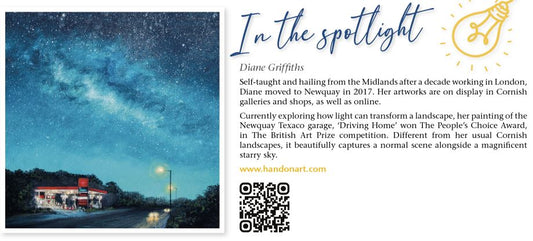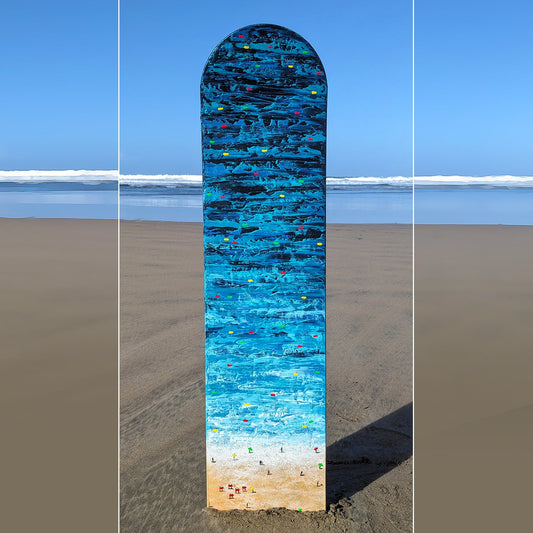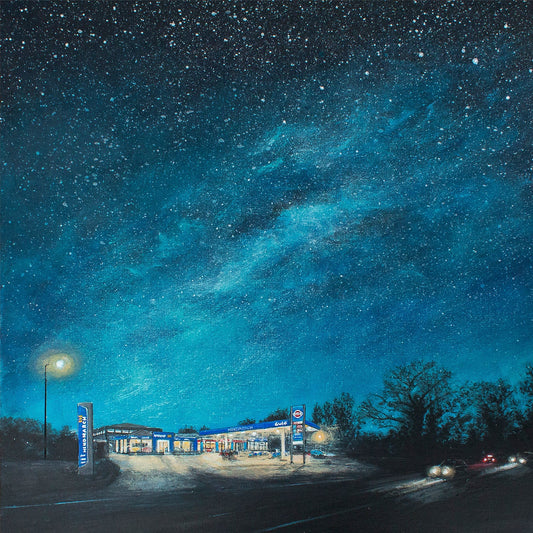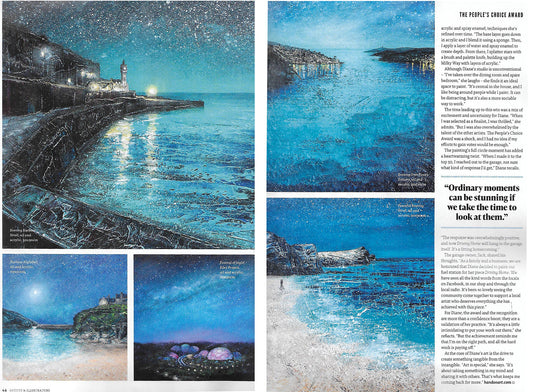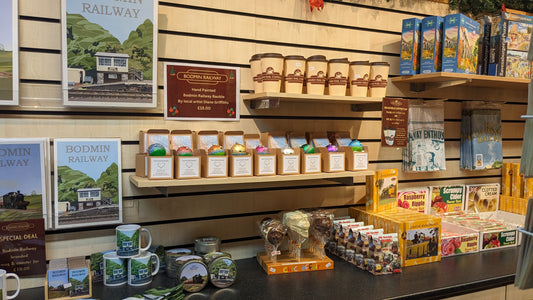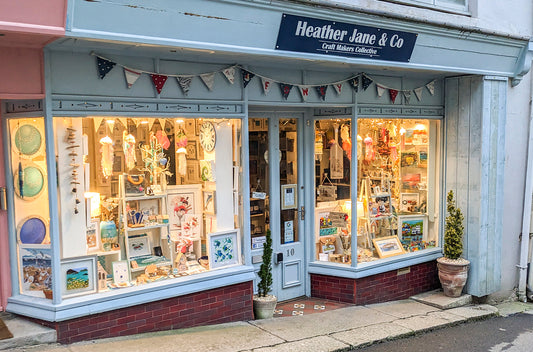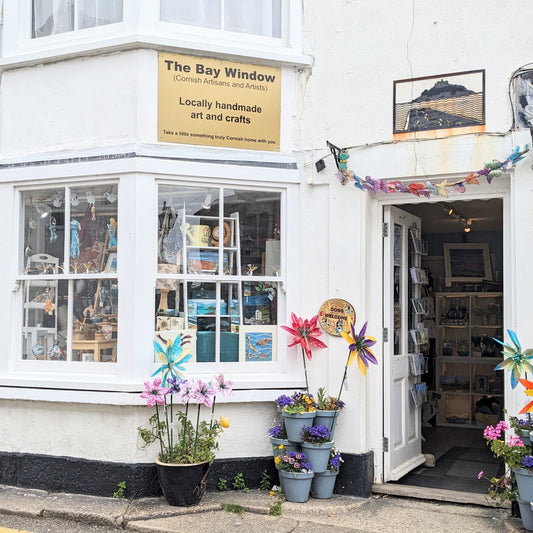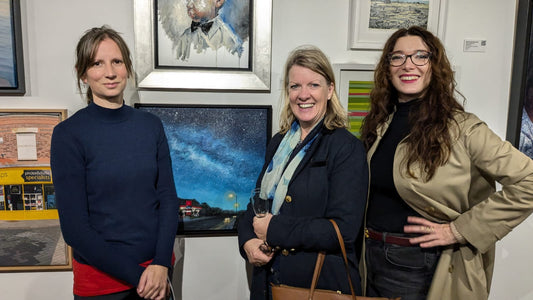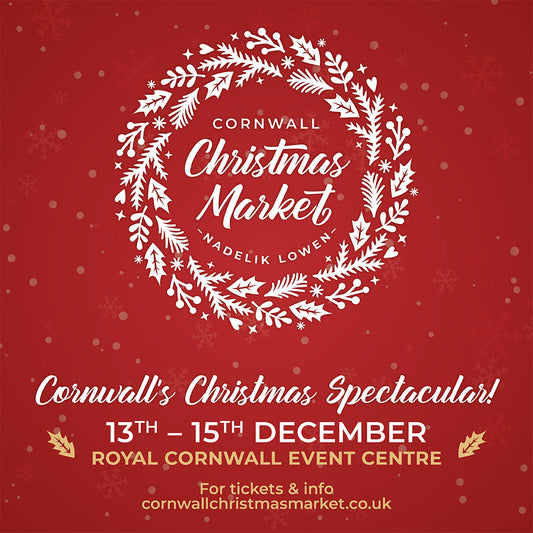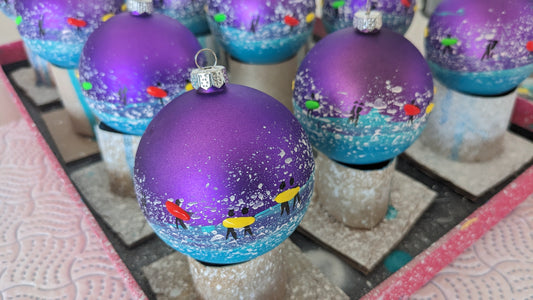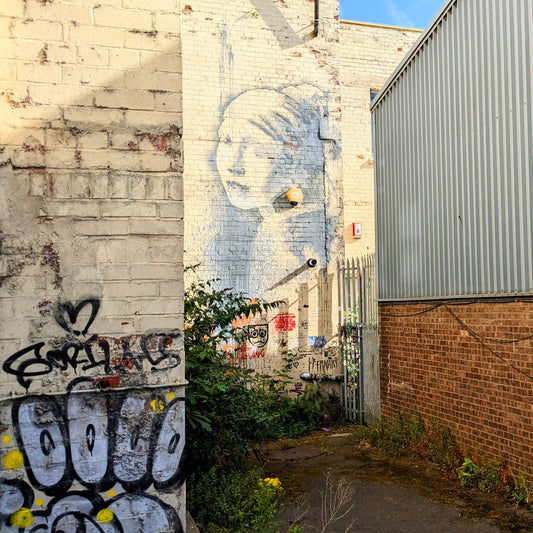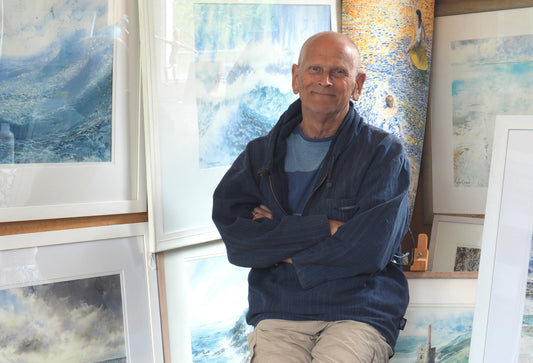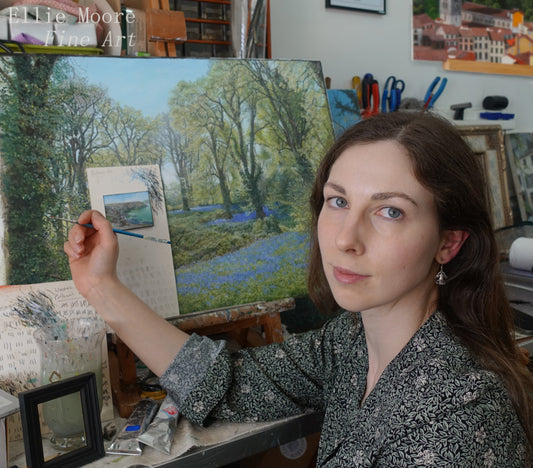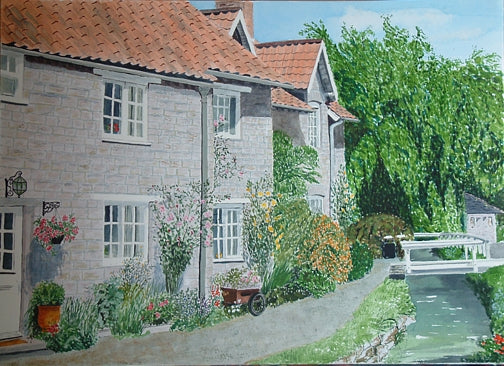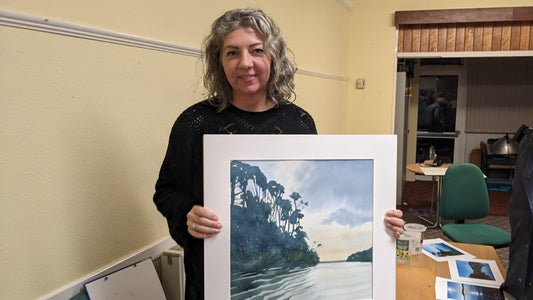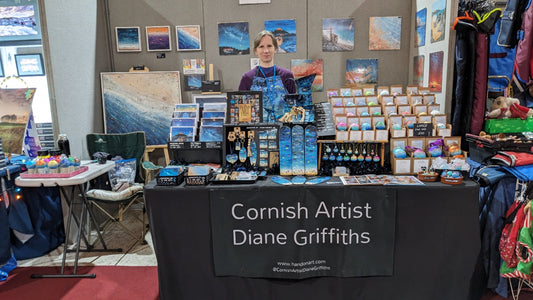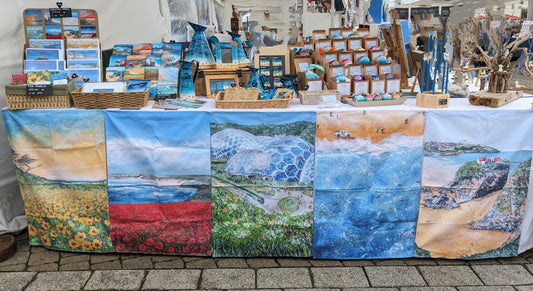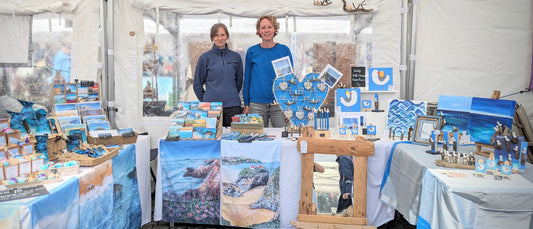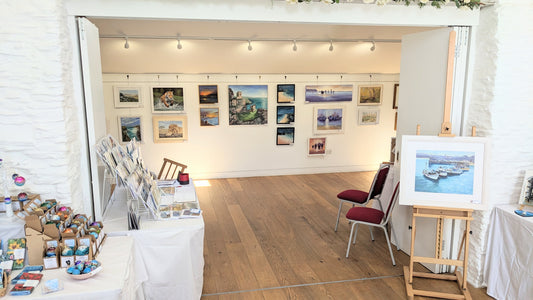Artist Interview - Joy Dix
Share
I've worked with Joy as part of the committee on the Newquay Society of Artists. She used to take on many tasks within the committee, something I didn't fully appreciate initially until I started to understand all the elements required in order to run the society. Steadfast, reliable and with her finger on the society pulse, I wanted to find out a bit more about her as the artist behind the committee member.


Born in Morley, West Yorkshire, I was brought up in a creative and artistic household. My parents were both singers, my brother and uncle both painters; my Dad made beautiful wooden models, toys and furniture whilst my Mum was an excellent seamstress.
My grandmother thought that all young ladies should be skilled in all homemaking arts and, despite the fact that she died when I was only 7 years old, she taught me how to knit, crotchet, sew and embroider; tapestry, lace, rug making and quilting. I made my first quilt for my doll’s pram when I was 6.
When it comes to painting, I cannot remember a time when I didn’t want to put pen or paint to paper; encouraged by my uncle to draw anything and everything. He was adamant that I shouldn’t be given colouring books. He said that they stifled artistic growth and imagination and that children should be allowed to express themselves freely.
I have no formal art training but have simply always felt the urge to paint and to maintain most of my crafting skills; albeit mostly on a family basis whilst my children were growing up; returning to creative art in my 50’s when I had more free time.
I had a modicum of success during those early years, concentrating mainly on landscapes, seascapes and wildlife, including pet portraits and these are still the themes that inspire me the most although I do occasionally stray into florals. I had a small gallery just outside York until we decided to relocate to Cornwall in the early 2000’s.
As my husband’s health deteriorated my art activities once again took a backseat, restricting me to participation in the local art society’s demonstrations, workshops and exhibitions. Since his death I have returned to full time creativity of both artwork and a variety of crafts.
So, as to what leads me to creating art; an itch in the fingers that simply will not be denied.



2. You often take part in craft fairs - can you tell me a little about the experience and any tips for other artists thinking about doing craft fairs?
I’ve always enjoyed running a stall at occasional craft fairs but it is only in the last year that this has been an almost full time occupation.
For anyone thinking of venturing down this route I would have to say; do your research first. It’s a lot of hard work, not just on the day but behind the scenes; maintaining the stock, travel to and from the venues, maintaining accounts and social media, not to mention ensuring that you have the necessary licences, insurance, etc...
It is possible to make money from your art but only a select few are ever going to make a satisfactory living from it. So be realistic in your expectations and aspirations.
Paintings at a craft fair do not sell on a regular basis. You either have to invest in peripherals; i.e. prints, greeting cards, and transfer of your artwork on to commodities (mugs, coasters, cutting boards etc...) or, like me, you must offer a large variety of handmade products.
I supplement my framed and unframed paintings with an eclectic mix of craft products. I extended paintings to include sea glass, pyrography pictures and gifts. I produce handmade jewellery and revived my other creative skills so I can offer handmade items of clothing, toys and trinkets and traditional quilts and a best seller. The items which often pays the table fees are my hand painted watercolour greetings cards.
Realistically, for anyone looking at craft fairs as a way of making a primary living, it probably won’t, unless you treat it as a business, work incredibly long hours and also work hard at selling online.
If you simply want to supplement your income and finance your hobby, you definitely can.
For me…I love it. I’m a gregarious person and love meeting people so it suits me down to the ground. I love the act of creativity, both art and craft products. I enjoy being at the craft fairs, chatting and selling. I don’t even mind the slow days when expenses outweigh the sales, You have to expect them.
Alongside the craft fairs I run a personal website and Facebook Page (neither as effectively as I should) but both add to my sales; even from as far away as Canada and the USA and maintaining a social media presence is a definite must to promote craft fairs and products.


That would have to be a watercolour of Hovingham Ford Cottages in North Yorkshire. At 31x24” it’s the largest watercolour I have done, although I have done larger in both oils and acrylics, but it’s the only painting that my late husband would never part with. The area all around Hovingham was a favourite haunt and we spent many happy hours in the area. Rob was my greatest supporter and also my greatest critic but he loved that painting.

Now that’s a hard one. It’s easy to fiddle and lose the spontaneity of a painting, especially in my favourite medium of watercolour. I try not to allow my paintings to take more than three sessions.
The underpainting, when it must be left to dry completely.
The build-up of mid tones and detail.
Emphasis of the darks and highlights.
At Stage 3 I try to only make enhancement to the darks and lights that immediately draw my attention and not go looking for them lest I overdo it. Then I put the painting aside for at least two days, If nothing then immediately screams for attention, it’s finished.
5. This next question is a tricky one, but it's one I've been pondering for a while. How do you define success as an artist?
Yes, another tricky question, the answer to which, I suspect, is different to different people.
For me, success is every time I sell a painting and I see the delight in the purchaser’s eyes, knowing that they just couldn’t leave it. My delight matches theirs knowing that someone else loved my work.
I doubt I’ll ever achieve financial success as an artist but I hope I never ever lose the thrill of the sale.



6. Inspiration is an important part of creating art, but also so its evolving and growing as an artist. How do you develop your art skills?
My inspiration has always come from the world around me and I can’t see that ever changing. Likewise, whatever the medium, my painting inclination will always be towards realism. Not photo realism, but always with enough realism versus artistic license that the subject matter is recognisable.
Although I’ve never studied art, I think it’s important to study the way other artists’ work. Not in order to copy but always watching out for new ways of working that might be incorporated into one’s own practice and improve one’s own work.
To this end I’ve always enjoyed the company of other artists. For decades I’ve been a member of Wet Canvas! And also in more recent years Painting Friends. Both are superb artistic communities online.
Through them I’ve enjoyed collaboration, discussion, competitions, workshops and even painting holidays, resulting in long term friendships with other artists around the globe.
As an active member of the Newquay Society of Artists and previously Truro Art Society I thoroughly enjoy all the many and varied demonstrations and often can hardly wait to try out some new technique. I also enjoy participating in the workshops.
Ideally I would have loved to have taken an Art Degree but the opportunity never arose and I doubt that it will now but I still enjoy trying out new things and feel that I am open to new experiences and constantly developing my art.
Please see below contact details:
Face to Face…You can meet me and see my work any Wednesday, Thursday or Friday at: Mevagissey Craft Fair, Jubilee Hall, Mevagissey, from Easter to mid-October.
This increases to every Wednesday to Sunday inclusive throughout August when I also have fun with the children (and a few brave adults) using their faces as my canvas.
For direct contact my e-mail is: joy@dix.myzen.co.uk
And my business telephone number is: 07817 002587
I can only thank Joy from the bottom of my heart for her open and honest answers to my questions. I relate and agree with a lot of what she has said. One of the big take-aways from her interview is about supplementing painting income with other art related gifts; whether printed or hand painted - something I've done myself and we've both found it to be successful, while expanding our customer reach. She understands the reality of being an artist and isn't afraid to share her insights through to a genuine path to success. We're not talking red carpet success, but a level of success that allows people to enjoy your art and for you to see that enjoyment.
However it's also fair to say that doing your research is crucial; as Joy mentions - craft fairs and having products in shops sounds amazing, and it is, but it's a lot of hard work. Hard work which takes you away from painting. That might be ok, but from experience I've found it a frustrating paradox at times.
I've also really enjoyed reading a bit about Joy and how she got started through to today. I've only known her for the last few years but immediately saw that she is a force to be reckoned with; balancing thorough organisation and accounting skills with her creative side and also caring for her husband. She is a lady of many talents and never gives in, it's that determination which makes her successful in everything that she does.
A touching, brave and thought-provoking interview - thank you Joy!
